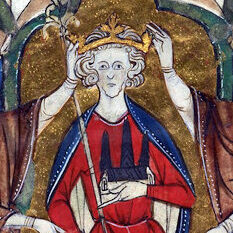1254

Before leaving, Henry appointed his wife Eleanor to rule in his stead with Richard serving as her adviser. Their immediate task was to replenish the treasury, drained by the affairs in the south, even if it meant nickel and diming. Eleanor contrived to have the citizens of London make back payment for the queen’s gold, her percentage of the arbitrary fines and import duties the king would levy on the city. Richard was rebuffed when he made an appeal to the Jewish community. The chief rabbi insisted they had no more money to give now that papal merchants had cornered the usury market. Fed up with the royal reaming, he asked permission for his people to leave the kingdom. And just where were they planning to go? Even Louis, that most saintly of monarchs, was openly hostile to them. Neither act of extortion added much to Henry’s coffers, so an Easter parliament was summoned to ask for funds. War with Castile was imminent, the regents announced, and the king needed money and manpower. Some enormous darts were even put on display to show the kinds of weapons he was up against. The magnates were dubious, not least because the queen was making plans at that very moment to travel with Edward to this so-called war zone. But it was de Montfort who exposed the subterfuge. Sent specifically by Henry to report on the king’s success in achieving peace in Gascony, Simon did exactly that, and parliament denied the royals their request.

The 1254 parliament summoned by Queen Eleanor was another milestone in the evolution of Western democracy. As part of the war footing, the sheriffs were ordered to muster the roll of knights in their counties to have two of them, elected by their peers, appear at her parliament with an offer of local assistance. These knights did not arrive in shiny armor ready to wield sword and mace for the king. By this stage the term had come to mean anyone with enough income to support the cost of knighthood. And Henry wasn’t interested in raising an army in England anyway. He could easily do that in France; he just needed someone to pay for it. These elected “representatives” were only being asked to show the money, but their presence established a precedent for future parliaments, starting with de Montfort’s.
The representatives weren’t against helping the king, but he would have to help them first. The sheriffs always rated special mention whenever local grievances came to Henry’s attention, but he was loath to act so long as they provided a steady source of income for the crown. Simon and the other barons would make the appointment of these officials one of the key elements of reform.